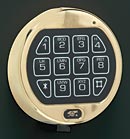One of the most common questions we hear at the GunSafes.com office is “Should I get a manual dial or an electronic lock?”
The choice of lock is largely personal, and both options have their pros and cons.
The old-fashioned manual tumbler lock is typically less expensive than an electric lock. A dial will never wear out or need to be replaced, and it will not automatically lock you out from repeated failed efforts to access. We have also had people who prefer this option because it is virtually silent, a big plus if you find yourself in a dangerous situation where you need to access a firearm quickly and quietly.
Dial locks, however, are difficult to read in low light situations, and take a little more time to access than electronic locks. You not only have to remember the numbers of the combination, but also the pattern and direction to turn the dial. If you miss the mark, you have to start over. Dial locks also require you to spin the dial after closing the safe in order to ensure it locks. If you ever want to change your combination, you will have to contact the manufacturer or a locksmith.
Electronic locks are quick; just punch in the numbers and you’re in. You don’t have to do anything extra to lock the safe, just close it. They are much easier to access in dimly lit areas, even if they aren’t illuminated, because of the simple grid layout of the numbers on the keypad. Electronic locks are easier to change the combinations on, as they don’t require any special tools. Many electronic locks have an automatic lock out feature, so if someone tries three or four incorrect combinations, they will be locked out for 15 to 20 minutes. This can be a desirable or undesirable feature depending on your point of view.
However, electronic locks make noise (some of these have an option to turn off the “beep”). You also need to change your combination occasionally on an electronic lock, as the keypad will eventually show wear marks that reveal the numbers in your combination. Though a thief would still need to figure out the right order, this does make his job a little easier. E-locks can suffer electronic failure, though this is very rare. In case of an electromagnetic surge, such as a severe solar flare or nuclear explosion, an e-lock would not be able to function. They do require a battery change at least once a year, though this is external and quick to do.
As far as security, both locks are equally good. Neither is easy to bypass, and both are going to be inoperable after a major fire.
Ultimately, the buyer needs to weigh speed, convenience, and ease of access, and decide which option is right.

